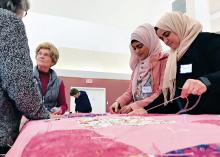Decolonization, interfaith dialogue, intersectionality—these terms can feel heady and intimidating, but Suzanne Gross says they can all happen through the well-practiced Mennonite art of hospitality.
Gross serves as Bridge Building Facilitator for Mennonite Church Alberta. MC Alberta has a long history of intercultural, interfaith work. Dona Entz built the foundation for the ministry. For 10 years, Entz and her husband Lorne lived in north Edmonton, which has a large Muslim and newcomer population. Entz sought to know her neighbours, giving and receiving hospitality in her local context. When Entz retired from her role in 2011, MC Alberta considered what the next steps might be and how each MC Alberta congregation could be an agent of peace in their own specific context.
“This initiative was related to tensions in broader society,” explained Tim Wiebe-Neufeld, executive minister for MC Alberta. “Peace comes when we find those places to cross boundaries, rather than getting into our own silos.”
Suzanne Gross, who also pastors part-time at Holyrood Mennonite in Edmonton, has been tasked with leading the next iteration of the bridge building ministry. The framework of the ministry consists of four intersecting areas: hospitality, peacemaking, dialogue and witness. Gross emphasizes communal responsibility for the ministry. “This is what I inherited, but it is for all of us to embrace.” She sees her role as helping communities imagine what the work could look like in their context. “For example, Edmonton has a large Somali community,” she notes. “The principles used there play into how we relate to everyone.”
Gross’s work includes preaching in MC Alberta churches, connecting with other faith groups and supporting Mennonites in applying Bridge Building ideas to their own contexts. Gross encourages people to use the long-held Mennonite tradition of hospitality as a starting point. “Hospitality is not about entertainment,” she says. “It’s about creating genuine space.” It’s about “peace-building.”
Referencing I Peter 3:15, Gross says hospitality really informs how we, “tell people the source of your hope.” Through hospitality, “we’re building hope together,” she says.
As much as Mennonites are known for their hospitality, they also have a reputation for being insular, even among fellow Mennonites. Gross, who is Swiss Mennonite by background, recalls bringing some Swiss Mennonite foods to a church potluck to share with her Russian Mennonite congregation. “There wasn’t as much curiosity as I’d hoped,” she laughs.
She says that curiosity is the panacea to being insular. “You know, there’s nothing wrong with ‘the Mennonite game.’ It’s when curiosity stops, that is the problem.” Her vision is for the family of nations to come alongside each other, to celebrate similarities and differences, to overlay, overlap and adapt. “All that leads into peace-building,” she says, “genuine peace-building.”
Hospitality will often pull us out of our comfort zone. Gross recounted a story about Mennonite Central Committee’s Great Winter Warm-up comforter making event in early 2020. MCC had worked with Edmonton’s Islamic Family and Social Services Association (IFSSA) to help bring Syrian refugees to Canada. Through IFSSA, event organizers hoped to welcome some Muslim neighbors to participate. There was little interest until Gross made a personal connection with the invitees, letting them know about the mutual relationship between IFSSA and MCC. “Connections have to be made,” explained Gross, “you don’t just dance alone.” In the end, 22 Muslim women came and stayed for the entire day.
Ultimately, Gross encourages each congregation to look around, both at who is in their pews as well as in their neighbourhoods and to simply show up. “Every congregation should consider the passions of people in the benches. Prayer is maybe the foundational part of this. Keeping in our prayers the right relations that we’re all longing for. So, who is in the benches? Is there someone who has a natural knack for showing up, and bringing others along? Every church has someone like that. Then we need to empower them on behalf of the church to show up,” she emphasizes. “As people, we’re not good at showing up, but someone goes with you, that makes all the difference. In our culture, there is a poverty of being vulnerable, and work is about relationships. And everyone can pray, and listen to stories. We do things in community.”
This article appears in the May 19, 2023 print issue, with the headline “Hospitality as witness.”
Do you have a story idea about Mennonites in Alberta? Send it to Emily Summach at ab@canadianmennonite.org.




Add new comment
Canadian Mennonite invites comments and encourages constructive discussion about our content. Actual full names (first and last) are required. Comments are moderated and may be edited. They will not appear online until approved and will be posted during business hours. Some comments may be reproduced in print.